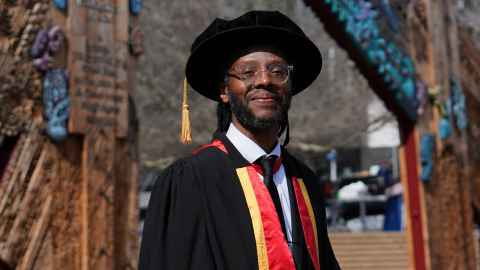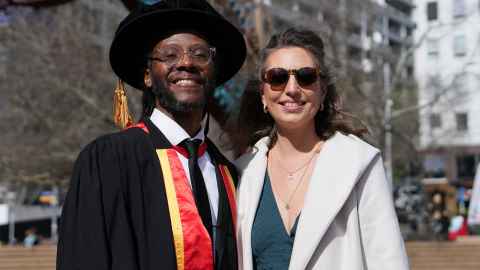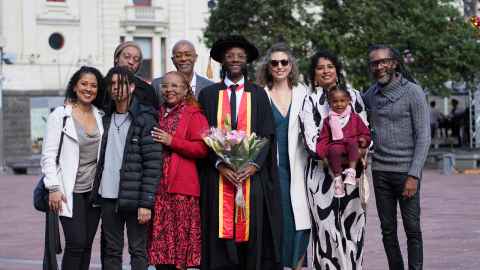Graduate champions climate justice in world’s highest court
4 September 2024
Law graduate Justin Sobion is helping to tackle one of the world’s biggest problems in the world’s highest court.

It was an article about Aotearoa's 'human river' that inspired Caribbean-born, international environmental lawyer Justin Sobion to embark on his doctoral studies at Waipapa Taumata Rau University of Auckland.
Despite living in Switzerland and enjoying a role at the UN as a human rights officer, the article, which told of how the Whanganui River was the first in the world to be recognised as having the same legal rights as a person, piqued his interest.
"It was fascinating to read about this legislation that sought to protect the river and aligned with the Māori worldview that the river is a sacred living entity. It got me interested in the country, tikanga, and the legal system here," says Justin, who graduated in Tāmaki Makaurau this week with family, friends and colleagues.
Celebrating the end of his "scholarly marathon" feels amazing, says the Auckland Law School graduate, who missed his family and often felt bad for his wife as he spent hours working on his thesis, which he began in 2019.
"I'm indebted to my family, my mother Judith, and brothers Jules and Darien in Trinidad, for their love and support," he says in the acknowledgements section of his thesis, which is recognised on the Dean's List for its exceptional quality.
"To my wife Aurélie, you have been very patient with me,” he writes.
“On many occasions, I felt like a mundane husband electing to stay indoors like a hermit, in solitary study, instead of exploring the great outdoors with you."

Titled 'Earth Trusteeship: A Framework for a More Effective Approach to International Environmental Law and Governance', Justin's thesis begins with a quote from politician, iwi leader and activist Debbie Ngarewa-Packer: "The moment you become attached to the water, the ocean, you become guardians, kaitiaki."
Guardianship is a major element of Earth Trusteeship – an idea that posits that the Earth and its resources could be held in trust by states for current and future generations.
The aim of Justin's thesis was to explore whether Earth Trusteeship could provide a framework for a more effective approach to international environmental law and governance, thereby addressing head-on the ecological crisis.
"To be a trustee means you give up some authority because you're acting on behalf of someone else," he says. "That's a challenge, especially in a world where many states prioritise their own interests
"Despite these challenges, I think Earth Trusteeship will become increasingly important as the global community grapples with environmental crises," says the PhD graduate, who, along with being a senior law tutor, author, artist and new dad, is currently working on one of the world's most significant climate justice cases to date.
Initiated by Vanuatu, 132 nations are asking the International Court of Justice (ICJ), which sits at The Hague, in the Netherlands, to establish the obligations of countries to address the climate crisis – and the consequences if they don't.
Eight Caribbean countries have filed written submissions at the ICJ for an outcome that will strengthen the region's legal position in terms of climate loss, damage claims and negotiations. And Justin, born in Trinidad, is representing Grenada, Saint Vincent and the Grenadines, and Saint Lucia.
"In my doctoral studies, I was looking at the duties of states, particularly around holding the Earth in trust for future generations. So I was a good fit to work on this case."
This month, the UN's top court announced that public hearings for the landmark case will begin on 2 December, and Justin is coordinating the Caribbean's submissions while also tutoring.
"I love interacting with the students. It makes me remember the days when I was a student 20 years ago; how you can be naïve about law and how you can feel so overwhelmed, especially if you have just come out of high school.
"If I look at all my law school grades, the first year was the worst. I started law school at 17, and grappling with the law and this new world you venture into is hard."

In 1979, 17 years after Trinidad and Tobago gained independence, Justin was born into a close-knit family, many of whom were lawyers.
"Uncles, aunts and other family members were all in law. One aunt was a Master of the Supreme Court, and my dad's law office was near my primary and secondary schools, so my brothers and I would always stop by there after classes."
Justin's dad, Keith, was a member of the first class of graduates from the Hugh Wooding Law School in Trinidad in 1975. Before that, all law graduates from the West Indies trained in the United Kingdom.
Keith's career was esteemed.
He rose to the position of Attorney General and Minister of Legal Affairs of Trinidad and Tobago, and was later appointed Principal of the Norman Manley Law School in Jamaica, where he served for 12 years before passing at 56.
"My dad didn't put any pressure on me or my siblings to get into law, but he was my role model and was instrumental in my decision to pursue law," says Justin.
"And when I did become a lawyer, he admitted me to the bar."
Celebrating his graduation this week with Aurélie, his son who's soon to turn one, and family who have travelled from around the world to be with him, Justin's thoughts are with his father, his biggest inspiration.
"He achieved so much in a short time, although he didn't have a PhD, I think he would be really happy to see that I got one."
Media contact:
Sophie Boladeras, media adviser
M: 022 4600 388
E: sophie.boladeras@auckland.ac.nz